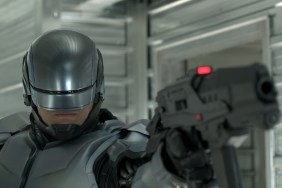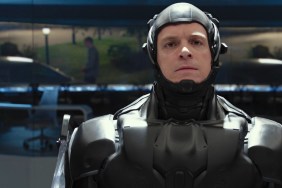
“Can I give a message to all the hardcore fans?” Michael Miner asks at the tail-end of our interview, “Please put down your rocks and spears. I’ve seen the film. It’s really great.”
Miner, alongside Edward Neumeier, wrote the screenplay to the original 1987 RoboCop. Directed by Paul Verhoeven (in his English-language debut), the film met with success both at the box office and with critics. Now, 27 years later, Columbia Pictures and MGM are rebuilding RoboCop for a new generation, setting Jose Padilha (also in his English-language debut) at the helm.
With the new blockbuster hitting theaters on Wednesday, we caught up with both Miner and Neumeier to discuss their original film, Padilha’s 2014 version and the future of the RoboCop franchise.
CS: Take me back to your earliest “RoboCop” memory. Where did it all begin?
Edward Neumeier: Well, I guess we have to go back into the ’80s, I’m afraid. I was a young man working at Columbia Pictures of all places. I was thinking desperately of a movie that I wanted to write. It was an adventure with a science fiction idea about business, actually, and about how badly corporations can behave. But I was very interested in science fiction and was working under the notion then that it was too expensive for a first time movie. Right next to my office, though, they were making this big science fiction movie, which we all came to know as “Blade Runner.” I was so desperate to work on movies at age 24 that I used to just leave my office at the end of the day and go over there and work on that movie. It was so big that they didn’t know who was working on it. After about three or four days of doing that and working nights without getting enough sleep, I had this blazing idea about the thing I had been thinking about and realized that it should be called “RoboCop.” I had a notion that it was about a guy, a robot, who is watching human beings and trying to figure them out. I think it was very closely tied to the environment of that set. Then the next big discovery was, “Hey, what if we killed a guy and it was a human that became a robot?” That was the most essential idea. I was off to the races! I was an executive at that point at Universal and spent time in board meetings. No robots would come in and kill people, but was almost as if. So I was kind of channeling all that stuff. I had met Michael Miner. We went to the same film school, but didn’t know each other. He was a little older than me and he was directing a rock video. I told him about my idea and said, “I have this story. I want to write ‘RoboCop.'” He said, “Wow!” We were two young guys with nothing to lose and we wrote the script. I got it to a producer — who was a very good producer, Jon Davison — and he really was the right guy. He knew all these interesting people like Rob Bottin and Phil Tippett. Through his deal at Orion, he set it up. Then, through his friend Barbara Boyle, who he had worked with through New World Pictures for Roger Corman. She was the head of business affairs at Orion, I believe, and she said, “Why not give it to Paul Verhoeven?” And they did. I think that Paul Verhoeven is one of the best filmmakers of his generation. I now think about how lucky I was that he would come along and direct that movie. It really worked out. We worked on the script together and I was allowed to produce it alongside Jon Davison. We actually shot the script we wrote and it turned out better than anyone suspected. It’s a tale of great luck in my mind.

CS: You went on to work with him on “Starship Troopers” as well.
Neumeier: Yeah, it started on “RoboCop.” We started talking and it led to “Starship Troopers” years later.
CS: Is science fiction in particular what interests you as a writer?
Neumeier: Certainly after “RoboCop,” they didn’t want to hear about my romantic comedies. No, I’m kidding. I used to tell everyone, “I wrote this script for two people. The eight-year old, which means we have to make it a great adventure, and the 28-year old, which is really the oldest age that matters in the movie business.” The 28-year old can get the jokes out of it that the eight-year isn’t going to get and doesn’t need to. So we always wrote it with two audience levels in mind. I kind of wrote it that way just to see if it would work. It worked so well that I tried it again in “Starship Troopers.” The good news for me with the new “RoboCop” — because I’ve watched a lot of “RoboCop” movies now and, without singling any of them out, I haven’t been too pleased with any of them — is that it came as a pleasant surprise. Do you know what the common denominator is? Jose Padilha is a really good filmmaker! Twice I’ve been lucky with “RoboCop” so far.
CS: Like the original, the new film has a very satirical side to it.
Neumeier: I think it’s actually a very different movie, despite a lot of similarities. The big difference to me is that this is a Doctor Frankenstein movie whereas my movie is a Frankenstein movie, if you will. That is to say, it’s much more about the point of view of the creator and the creation than it is about RoboCop. The other thing that’s really different is that it’s about a man who has been injured severely as one might be by a roadside bomb and he’s put into a giant prosthetic device that keeps him alive and allows him to function. That’s somewhat different from the way the story in the first one was told. It’s not about identity or who he will be or become. It’s about how he’s going to hold onto himself. How will he cope with this violence that has been done to his body and to his person. I think that, in that way, both films have a storyline that’s about coping with, essentially, technology and how it changes you.
CS: Did you get any input on the new film?
Neumeier: It was a complete surprise. Almost an honor, if you will. Basically, the WGA does an arbitration of all the people that worked on the script. It’s all anonymous and they read everything against the final script. When they read all the scripts, they read our original and saw there was a pattern. The movies are very alike structurally and have a very similar story. When you’ve seen them, though, you realize that one is Jose Padilha’s version of that story and the other is kind of its own thing. So we didn’t have anything to do with it, but they decided that there was so much of our script in it that it wasn’t just based on, it was written by.
CS: Going back to the original, who was it that came up Bixby Snyder and “I’ll buy that for a dollar!”
Neumeier: That was mine! There was originally a bit more of the Bixby Snyder show, which was a show called “It’s Not My Problem!” It was just meant to be show that you never saw anything of except the tagline. It was a Fonzie idea. I wanted to have someone in there who just said something completely nonsensical. That was his tagline. He was this little hearty guy who went around trying to have sex with lots of women. It was meant to be a commentary on the media of the day.
CS: What’s next for you?
Neumeier: I’m writing for [producers] Neal Moritz and Toby Jaffe at the moment. They’re having me write a thriller set in Washington. I can’t tell you too much about it, but it’s about a girl who falls in love with a killer who works at the Pentagon. I’ve been doing that and thinking about a bunch of other stuff. I sort of would like to return to sci-fi. The interesting thing about science fiction now is that it’s very hard to come up with ideas that aren’t, on some level, happening right now. Like, the new “RoboCop” has a lot to say about drones and some of the next stuff that we’re going to see happening.

CS: What has been the most interesting aspect of seeing your idea realized and then continue to endure and change over the years?
Miner: So many things! I feel very blessed and I feel very lucky. First, Paul Verhoeven really made our script, which is a dream for writers. English is his second language, so he kept coming to us and asking, “How does this joke work?” and “How does that joke work?” I think 95% of our screenplay finished up on the screen. That aspect in particular spoiled me. Then I got into the bumpy road of being a screenwriter in Hollywood and it wasn’t quite as fun. There’s that. There’s also the sort of primal reaction that last year was the 25th anniversary. There’s a hardcore fan who saw the film. It was the first film that they saw. They were 15 and their dad took them, so it was kind of right of passage. They were very emotional about it. Ed and I worked very hard. We each felt fortunate to have our own voices in there, but the response has just been something incredible.
CS: They’re even building a statue in Detroit.
Miner: I know! Poor Detroit. I think that Ed, because of the automotive industry and me because of the union aesthetic and the fact that they would promote women and minorities. Corporate America specifically went after Detroit and punished it because of its liberal views on unions. You can see the legacy of corporate power. They went specifically at Detroit and destroyed that city.
CS: Speaking to that, there is certainly a political message at play both in the original film and in the new version.
Miner: Yeah, I really think that Jose and his team have completely protected and transmitted the DNA of our original into this new iteration. Again, being a foreign director like Paul, Jose views America analytically, like an anthropologist. He isn’t fawning over certain tropes that don’t really work. It’s very much about the ownership of the self and private property. If you remember John Locke, the philosopher, defined the individual of the self as someone who owns their own personality. If you don’t own your own personality, you’re a slave. Flash-forward to the new “RoboCop” and all these issues about corporate overreach and surveillance. Who owns the self? That’s really the concern of the audience and he really nailed that.
CS: There’s an interesting kind of meta side to the new film in that the plot actually involves a corporation building their own superhero.
Miner: Yeah, that’s a complex process, how a superhero is forged. Specifically in the case of RoboCop and because the original came at a time with Reagan and the privatization of assets, I think people felt disempowered. By identifying with that character and him taking back his own identity, I think that’s what created a lot of the deeply-involved fans. Fast-forward to today and I think those concerns are even more prevalent for an audience. Being disenfranchised and not in control. Being surveilled. The new film really transmits that DNA to a modern era where those concerns are still on people’s minds. He’s a very different kind of superhero. Different from The Dark Knight. Different from Iron Man. He’s got the kind of problem that I think an audience can really relate to.
CS: One of the larger differences between the original and the new film is that the new film follows the RoboCop’s creator to a much more significant degree.
Miner: Yeah, I think that’s really great. I think Oldman raises the status of the picture immensely and, as a sort of latter-day Doctor Frankenstein, starts to have compassion for the monster. I think that, like the original, you don’t get to really know RoboCop. He’s like a third person, kind of in the distance. Which is good. Jose keeps the mask, which keeps the audience away like it does with Peter Weller in the original. I think that’s a good thing. I think it lets the audience try to reach into his mind and they have more compassion as a result. Oldman is, I think, a terrific, terrific character in the new one.

CS: There have been a lot of iterations of “RoboCop” on beyond the two sequels and the new reboot. There was an animated series, a live-action series, comic books and so on. Is there, for you, an area of the expanded “RoboCop” universe that you’d like for fans to give another look?
Miner: Well, the pilot for the first TV show, Ed and I wrote that. RoboCop has a relationship with a personality inside a computer that we were hypothesizing a lot like the internet. It’s kind of a love story between the individual android and a big controlling computer. That was an interesting story that I think is better than “RoboCop 2” or “3.” I think people should check that out.
CS: What’s coming up next for you?
Miner: I’m working on a novel called “Mnemonic” about a society in which nothing is forgotten, which has a real downside for the people. I’m trying to get a television show on the air about juvenile justice. I’ve been involved in juvenile justice for almost about a decade now. There’s a horror thriller I’ve been working on about reincarnation called “Afterlife.” There’s a dystopic thriller called “The Panopticon” about surveillance. Again, going back to the “RoboCop” remake, I think Jose has a lot to say about surveillance and, god willing, it will carry forth into a sequel. I think he’s opened the door to a mature discussion about that. I look forward to a sequel. I think that would be great.
CS: Would you ever want the chance to return to the world of RoboCop as a writer?
Miner: In a millisecond. I would love to return to it. Ed and I had RoboCop rules. RoboCop can’t be on the telephone. He can’t kiss the girl. He can’t fly. I think they did all three of those in “2” and “3.” I think we have a lot more we could say about the future vis a vis cybernetics and the human machine interface. Don’t tell my agent, but I would pay MGM to work on the sequel!
RoboCop
-
Robocop Imax Poster 2

-
1174829 - ROBOCOP

Director Jose Padilha on the set of Columbia Pictures' "Robocop," starring Joel Kinnaman. -
1174829 - ROBOCOP

Joel Kinnaman and Abbie Cornish star in Columbia Pictures' "RoboCop." -
1174829 - ROBOCOP

Joel Kinnaman and Michael K Williams star in Columbia Pictures' "RoboCop." -
1174829 - ROBOCOP

Joel Kinnaman stars in Columbia Pictures' "Robocop." -
1174829 - ROBOCOP

Joel Kinnaman stars in Columbia Pictures' "Robocop." -
1174829 - ROBOCOP

L-r, Joel Kinnaman, Jackie Earle Haley and Director Jose Padilha on the set of Columbia Pictures' "RoboCop." -
1174829 - ROBOCOP

Marianne Jean-Baptiste and Joel Kinnaman in Columbia Pictures' "RoboCop." -
1174829 - ROBOCOP

Abbie Cornish stars in Columbia Pictures' "RoboCop," also starring Joel Kinnaman. -
1174829 - ROBOCOP

Joel Kinnaman, left, and Gary Oldman star in Columbia Pictures' "Robocop." -
1174829 - ROBOCOP

Gary Oldman in Columbia Pictures' "RoboCop," starring Joel Kinnaman. -
1174829 - ROBOCOP

Joel Kinnaman stars in Columbia Pictures' "Robocop." -
1174829 - ROBOCOP

Joel Kinnaman stars in Columbia Pictures' "Robocop." -
1174829 - ROBOCOP

Joel Kinnaman stars in Columbia Pictures' "Robocop." -
1174829 - ROBOCOP

Joel Kinnaman stars in Columbia Pictures' "Robocop." -
1174829 - ROBOCOP

Abbie Cornish, left, and Michael Keaton star in Columbia Pictures' "RoboCop," also starring Joel Kinnaman. -
1174829 - ROBOCOP

Joel Kinnaman stars in Columbia Pictures' "Robocop." -
1174829 - ROBOCOP

Joel Kinnaman stars in Columbia Pictures' "Robocop." -
1174829 - ROBOCOP

Joel Kinnaman stars in Columbia Pictures' "Robocop." -
1174829 - ROBOCOP

Joel Kinnaman stars in Columbia Pictures' "Robocop." -
1174829 - ROBOCOP

Joel Kinnaman stars in Columbia Pictures' "Robocop." -
Robocopposter

-
1174829 - ROBOCOP

Joel Kinnaman and Abblie Cornish star in Columbia Pictures' "Robocop."
-
1174829 - ROBOCOP

Joel Kinnaman, left, and Jackie Earle Haley star in Columbia Pictures' "Robocop."
-
1174829 - ROBOCOP

Michael Keaton in Columbia Pictures' "RoboCop," starring Joel Kinnaman.
-
1174829 - ROBOCOP

Joel Kinnaman stars in Columbia Pictures' "Robocop."
-
1174829 - ROBOCOP

Joel Kinnaman, left, and Gary Oldman star in Columbia Pictures' "Robocop."
-
1174829 - ROBOCOP

Gary Oldman, left, and Jackie Earle Haley in Columbia Pictures' "RoboCop," starring Joel Kinnaman.
-
1174829 - ROBOCOP

Joel Kinnaman stars in Columbia Pictures' "RoboCop."
-
RoboCop

-
RoboCop

-
RoboCop

-
RoboCop

-
RoboCop

-
RoboCop

-
RoboCop

-
RoboCop









